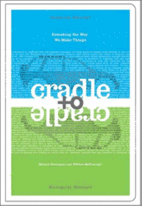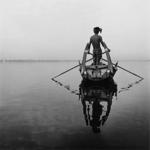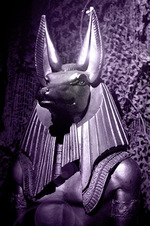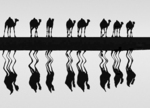The Fear Of Life And Death
Death wanders through our lives at will, sweet Death Is busy with each intake of our breath. Why do you fear her? Lo, her laughing face All rosy with the light of jocund grace ! A kind and lovely maiden culling flowers In a sweet garden fresh with vernal showers, This is the thing you fear, young portress bright Who opens to our souls the worlds of light. Is it because the twisted stem must feel Pain when the tenderest hands its glory steal? Is it because the flowerless stalk droops dull And ghastly now that was so beautiful ? Or is it the opening portal's horrid jar That shakes you, feeble souls of courage bare? Death is but changing of our robes to wait In wedding garments at the Eternal's gate. Reference: # 18 in "Les po?mes de Sri Aurobindo" (bilingual edition) also in "Collected Poems and Plays, vol 1" - 144
Death
Death is not the end Death can never be the end. Death is the road. Life is the traveller. The Soul is the Guide ... Our mind thinks of death. Our heart thinks of life Our soul thinks of Immortality. - By: Sri Chinmoy
Love
 Do believe I'll never leave you: Always I'll be in your heart. Don't forget my soul is near you, And so we'll never be apart
Do believe I'll never leave you: Always I'll be in your heart. Don't forget my soul is near you, And so we'll never be apart
Cradle to Cradle
 Remaking The Way We Make Things By William McDonough & Michael Braungart North Point Press, 2002 William McDonough's new book, written with his colleague, the German chemist Michael Braungart, is a manifesto calling for the transformation of human industry through ecologically intelligent design. Through historical sketches on the roots of the industrial revolution; commentary on science, nature and society; descriptions of key design principles; and compelling examples of innovative products and business strategies already reshaping the marketplace, McDonough and Braungart make the case that an industrial system that "takes, makes and wastes" can become a creator of goods and services that generate ecological, social and economic value. In Cradle to Cradle, McDonough and Braungart argue that the conflict between industry and the environment is not an indictment of commerce but an outgrowth of purely opportunistic design. The design of products and manufacturing systems growing out of the Industrial Revolution reflected the spirit of the day-and yielded a host of unintended yet tragic consequences. Today, with our growing knowledge of the living earth, design can reflect a new spirit. In fact, the authors write, when designers employ the intelligence of natural systems?the effectiveness of nutrient cycling, the abundance of the sun's energy?they can create products, industrial systems, buildings, even regional plans that allow nature and commerce to fruitfully co-exist. Cradle to Cradle maps the lineaments of McDonough and Braungart's new design paradigm, offering practical steps on how to innovate within today's economic environment. Part social history, part green business primer, part design manual, the book makes plain that the re-invention of human industry is not only within our grasp, it is our best hope for a future of sustaining prosperity. In addition to describing the hopeful, nature-inspired design principles that are making industry both prosperous and sustainable, the book itself is a physical symbol of the changes to come. It is printed on a synthetic 'paper,' made from plastic resins and inorganic fillers, designed to look and feel like top quality paper while also being waterproof and rugged. And the book can be easily recycled in localities with systems to collect polypropylene, like that in yogurt containers. This 'treeless' book points the way toward the day when synthetic books, like many other products, can be used, recycled, and used again without losing any material quality?in cradle-to-cradle cycles.
Remaking The Way We Make Things By William McDonough & Michael Braungart North Point Press, 2002 William McDonough's new book, written with his colleague, the German chemist Michael Braungart, is a manifesto calling for the transformation of human industry through ecologically intelligent design. Through historical sketches on the roots of the industrial revolution; commentary on science, nature and society; descriptions of key design principles; and compelling examples of innovative products and business strategies already reshaping the marketplace, McDonough and Braungart make the case that an industrial system that "takes, makes and wastes" can become a creator of goods and services that generate ecological, social and economic value. In Cradle to Cradle, McDonough and Braungart argue that the conflict between industry and the environment is not an indictment of commerce but an outgrowth of purely opportunistic design. The design of products and manufacturing systems growing out of the Industrial Revolution reflected the spirit of the day-and yielded a host of unintended yet tragic consequences. Today, with our growing knowledge of the living earth, design can reflect a new spirit. In fact, the authors write, when designers employ the intelligence of natural systems?the effectiveness of nutrient cycling, the abundance of the sun's energy?they can create products, industrial systems, buildings, even regional plans that allow nature and commerce to fruitfully co-exist. Cradle to Cradle maps the lineaments of McDonough and Braungart's new design paradigm, offering practical steps on how to innovate within today's economic environment. Part social history, part green business primer, part design manual, the book makes plain that the re-invention of human industry is not only within our grasp, it is our best hope for a future of sustaining prosperity. In addition to describing the hopeful, nature-inspired design principles that are making industry both prosperous and sustainable, the book itself is a physical symbol of the changes to come. It is printed on a synthetic 'paper,' made from plastic resins and inorganic fillers, designed to look and feel like top quality paper while also being waterproof and rugged. And the book can be easily recycled in localities with systems to collect polypropylene, like that in yogurt containers. This 'treeless' book points the way toward the day when synthetic books, like many other products, can be used, recycled, and used again without losing any material quality?in cradle-to-cradle cycles.
Autobiography in five chapters
1) I walk down the street. There is a deep hole in the sidewalk I fall in. I am lost? I am hopeless It isn?t my fault. It takes forever to find a way out. 2) I walk down the same street. There is a deep hole in the sidewalk. I pretend I don?t see it. I fall in again. I can?t believe I?m in the same place. But it isn?t my fault. It still takes a long time to get out. 3) I walk down the same street. There is a deep hole in the sidewalk. I see it is there. I still fall in... it?s a habit My eyes are open I know where I am It is my fault. I get out immediately. 4) I walk down the same street. There is a deep hole in the sidewalk. I walk around it. 5) I walk down another street.
Pageviews : ?
Geblokkeerd door : 0
Favoriet bij : 2









